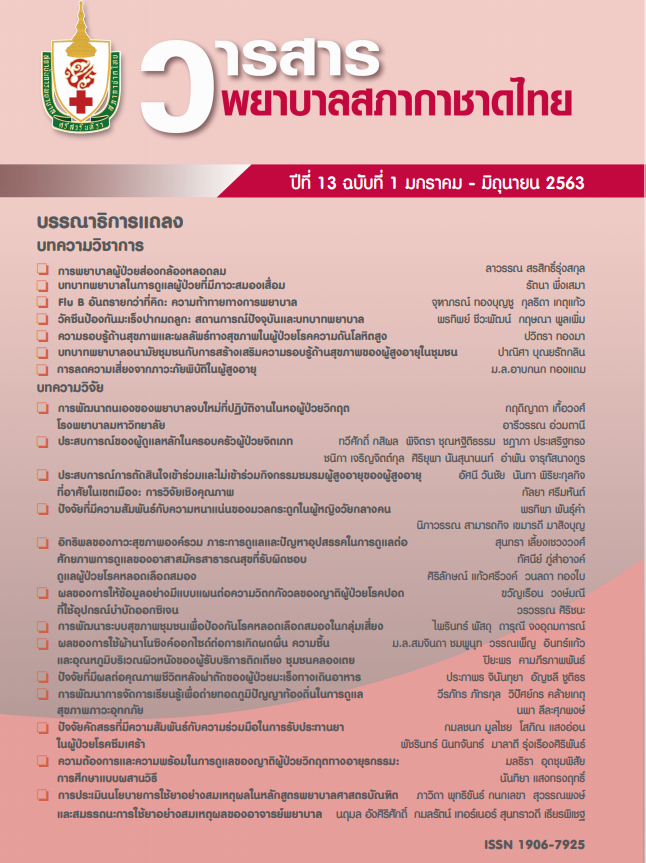Development of Management Learning: Transmitting Local Knowledge in Health Self-Care During Flooding Disasters
Keywords:
local knowledge, health self-care, floodAbstract
Flooding can seriously impact the health of people. Social change and current technological advances are constantly changing local knowledge in self healthcare. Moreover, having a government-dependency attitude rather than self-reliance poses various health threats. The purposes of this study were to explore local knowledge in self healthcare during floods in communities, to study the learning requirements and management of transmitting local knowledge in self healthcare during floods, to develop learning management of transmitting local knowledge in self healthcare during floods in a community context and to create media for transmitting local knowledge in self healthcare during floods. There were 2 phases of the research procedure. Phase 1 used a mixed methods approach consisting of (1) qualitative research to study local knowledge in self healthcare during floods by using in-depth interviews with local intellectuals and community leaders, (2) quantitative research to examine health issues, demands and usage of local knowledge in self healthcare during floods affecting 702 people in affected areas, and (3) qualitative research to study the development of learning resources for transmitting local knowledge in a community context in the form of media to be used in transmitting local knowledge by using in-depth interviews. Phase 2 relied on a research and development approach developed by experts and qualified persons, and verification of the learning management building process. The results of the study were as follows: the results of Phase 1 found that sought-after local knowledge in health management in Phra Nakhon Si Ayutthaya province consistsed of (1) local knowledge in food management, (2) local knowledge in medicine management, and (3) local knowledge in sanitation and waste management. The factors that affected the behavior of health management were recognition and accessibility of local knowledge. The results of Phase 2 of learning management to encourage people to use local knowledge in self healthcare during floods, the researcher developed learning activities that were in accordance with the community context and diversity by using comprehensible media communication. Participants’ knowledge after activities increased and was statistically significant at the .01 level. Participants had a good level of satisfaction with activities and displayed health care behaviors during the flood situation by using local knowledge at a high level.
References
2. Graham K, Spennemann D. Disaster management and cultural heritage: An investigation of knowledge and perceptions of New South Wales Rural Fire Service Brigade Captains. Australasian Journal of Disaster and Trauma Studies 2006;2006(1):5-31.
3. Chuawanlee W. Effects of external rewards and self - efficacy on students intrinsic motivation. Bangkok: The Behavioral Science Research Institute, Srinakharinwirot University; 1999. (in Thai)
4. Office of the National Security Council. National Security Policy of A.D. 2015 – 2021. Bangkok: Cabinet and Royal Gazette Publishing Office; 2015. (in Thai)
5. Rruanjan S. Health Management by Community–based Approach to Prepare for Floods and Landslides Disaster at Risk Area in Uttaradit Province. Uttaradit: Uttaradit Rajabhat University;
2013. (in Thai)
Downloads
Published
Issue
Section
License
เนื้อหาบทความหรือข้อคิดเห็นต่างๆ ในวารสารพยาบาลสภากาชาดไทยนี้ เป็นความคิดเห็นของผู้เขียนบทความ ไม่ใช่ความเห็นของกองบรรณาธิการ หรือสถาบันการพยาบาลศรีสวรินทิรา สภากาชาดไทย






